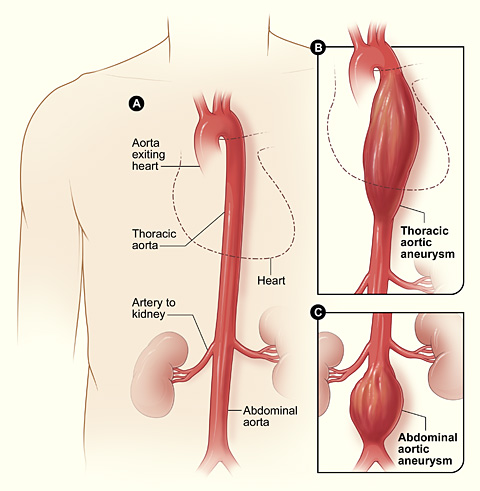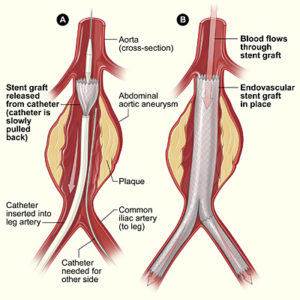 An aneurysm is a permanent ballooning in the wall of an artery. The pressure of blood passing through can force part of a weakened artery to bulge outward.
An aneurysm is a permanent ballooning in the wall of an artery. The pressure of blood passing through can force part of a weakened artery to bulge outward.
Although any blood vessel can be affected, aneurysms usually form in the abdominal or chest portions of the aorta, the main blood vessel that carries blood from the heart, or in arteries nourishing the brain. Aneurysms in any of these places are serious, while those in other locations such as the leg are often less hazardous.
The most serious threat an aneurysm poses is that it will burst and cause a stroke or life-threatening massive bleeding. If an aneurysm ruptures, the patient must be treated immediately to have a chance of survival.
Early diagnosis and treatment of an aneurysm are critical. Because aneurysms often produce either no symptoms or mild symptoms, routine exams are strongly encouraged so that a doctor can regularly test for warning signs of a more serious problem. Even if it doesn”t rupture, a large aneurysm can impede circulation and contribute to the formation of blood clots.
There are many types of aneurysms. Here are a few:
- Aortic aneurysm. The aneurysm is located in the aorta. Typically, the widened part of the aorta is considered to be an aneurysm when it is more than 1.5 times its normal size. They can be associated with the buildup of plaque caused by hardening of the arteries or atherosclerosis. Aneurysms may also be an inherited condition or a complication of high blood pressure or smoking.
- Cerebral aneurysm. Also known as a berry aneurysm, this occurs in the wall of a blood vessel in the brain. Smoking increases a person”s risk of developing a cerebral aneurysm.
- Ventricular aneurysm. This is a ballooning out of part of the wall of the heart. A previous heart attack most commonly causes ventricular aneurysms. In rare cases, severe chest trauma can also cause a ventricular aneurysm.
What Causes an Aneurysm?
Any condition that causes arterial walls to weaken or deteriorate can result in an aneurysm. The exact cause is unknown, but risk factors for developing an aortic aneurysm include:
- Smoking
- High blood pressure
- High cholesterol
- Emphysema
- Obesity
- Have a family history of cardiovascular or peripheral vascular disease (a narrowing of the blood vessels)
What are the Symptoms of Aneurysm?
Aneurysms develop slowly over many years and often have no symptoms. If an aneurysm expands rapidly, tears open (ruptured aneurysm), or blood leaks along the wall of the vessel (aortic dissection), symptoms may develop suddenly.
The symptoms of rupture include:
- Pain in the abdomen or back or chest depending on type of aneurysm. This pain is severe, sudden, persistent, or constant.
- Nausea and vomiting.
- Rapid heart rate
- Shock
 Endovascular Repair of Aneurysm
Endovascular Repair of Aneurysm
Instead of an open aneurysm repair, Dr. Augusto Villa, Cardiologist in Palm Beach Gardens, Florida, may consider a newer procedure called an endovascular aneurysm repair (EVAR, TEVAR, TA-EVAR). Endovascular means that surgery is performed inside your aorta using thin, long tubes called catheters. By entering through small incisions in the groin, the catheters are used to guide and deliver a stent-graft through the blood vessels to the site of the aneurysm. The stent graft is then positioned in the diseased segment of aorta to “reline” the aorta like a sleeve to divert blood flow away from the aneurysm.
This endovascular approach is currently used to treat abdominal and descending thoracic aneurysms, and is being evaluated as a treatment for thoracoabdominal and arch aneurysms. While current results are positive, further research is needed to determine who the best candidates for this type of procedure may be.
Dr. Villa will advise you regarding the best option for treating your aneurysm.
How to Prevent Aneurysm?
To reduce the risk of developing aneurysms:
- Eat a heart-healthy diet, exercise, stop smoking (if you smoke), and reduce stress to help lower your chances of having a blocked artery again.
- Your health care provider may give you medicine to help lower your cholesterol.
- If you were given medicines for blood pressure or diabetes, take them as your doctor has asked you to.
People over age 65 who have smoked at any time in their life should have a screening ultrasound performed once.
